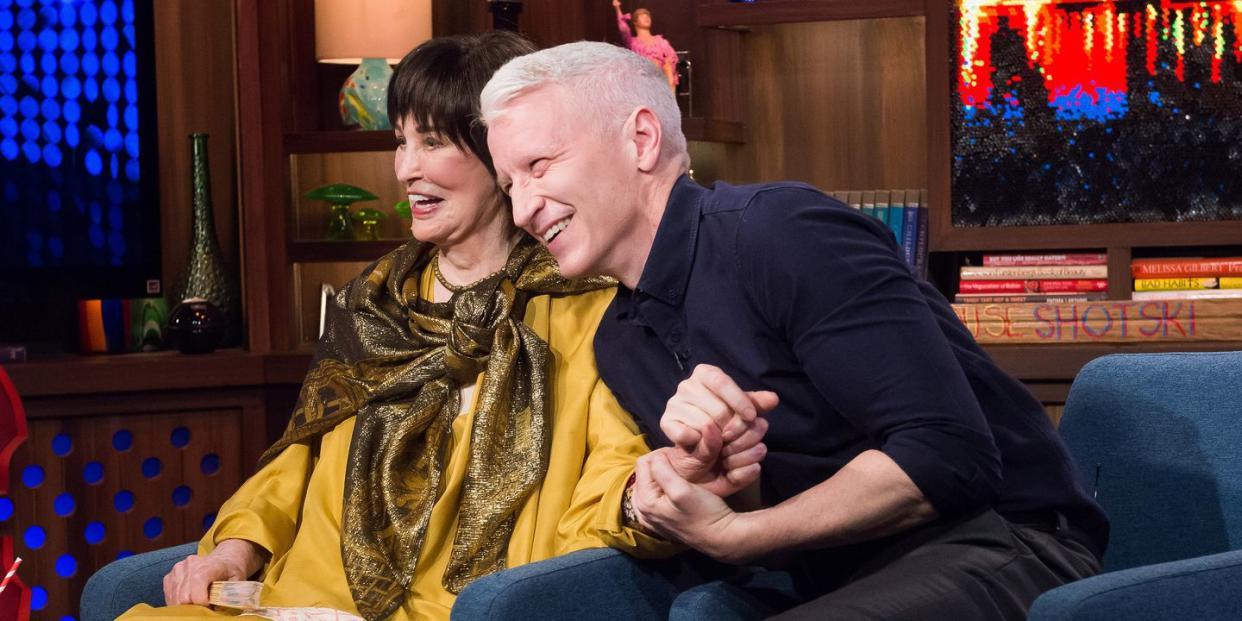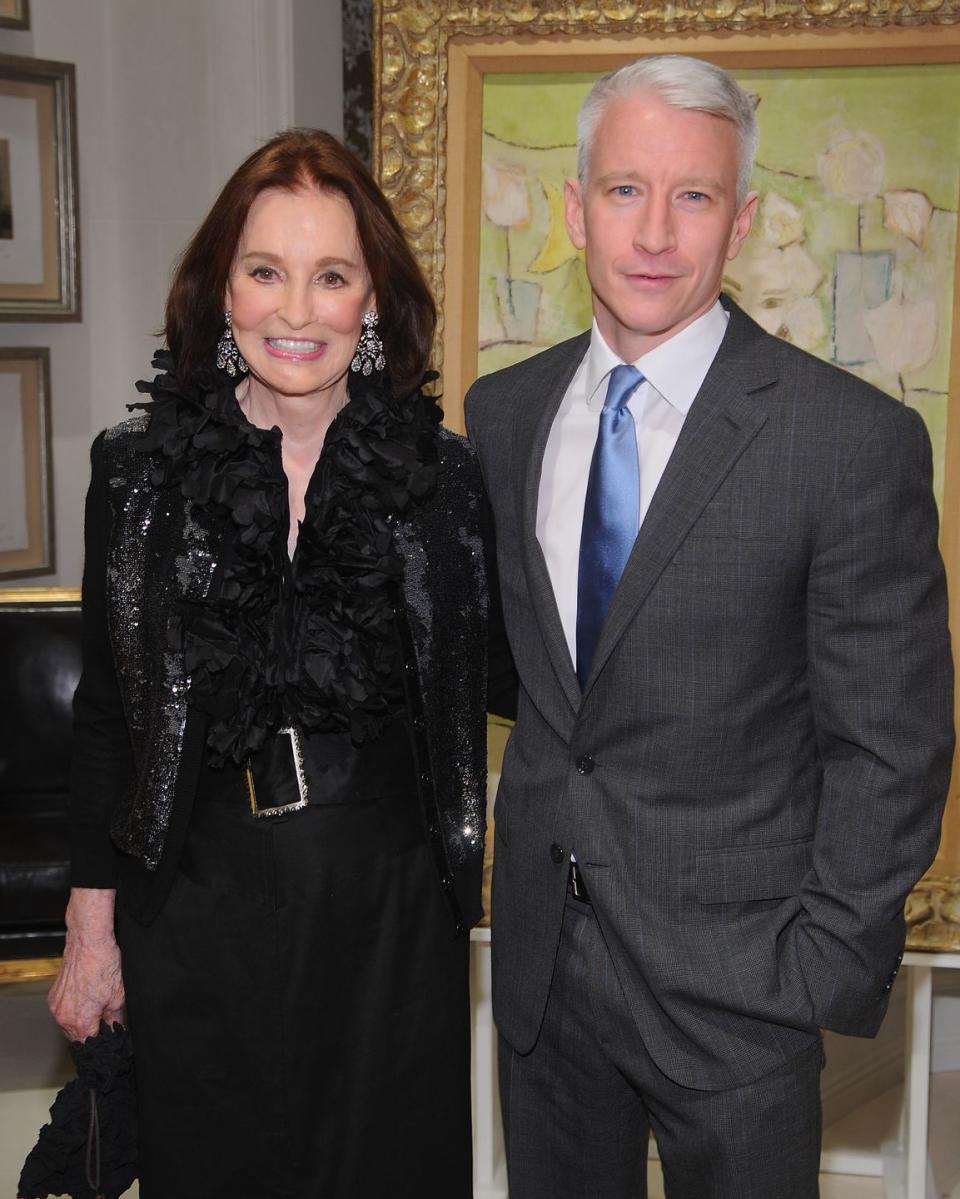Anderson Cooper Delivers a Moving On-Air Eulogy for His Mother, Gloria Vanderbilt

As a news anchor, it's Anderson Cooper's job to regularly inform his viewers of a celebrity's passing. But his eulogy for Gloria Vanderbilt, who recently died at the age of 95, was never going to be standard-issue.
Cooper delivered a moving on-air speech about the inimitable icon-an heiress, a writer, an artist, a socialite, a multi-hyphenate before that was a thing-who also happens to be Cooper's mother. His words were intercut with documentary footage, which ranged from 20th-century newsreels to Cooper's own recent interview with Vanderbilt. Cooper even shared some of his own video-a clip of his mother giggling in a hospital bed, not long after she'd learned of her cancer diagnosis.
Here, all of Cooper's own words-for the full experience, complete with archival footage, watch the CNN clip embedded below.

Read the transcript in full.
Gloria Vanderbilt lived her entire life in the public eye. Born in 1924, her father Reginald Vanderbilt was heir to the Vanderbilt railroad fortune, but gambled away most of his inheritance, and died when my mom was just a baby. Gloria Morgan Vanderbilt, her mother, wasn't ready to be a mom or a widow. My mom grew up in France, not knowing anything about the Vanderbilt family or the money that she would inherit when she turned 21. She had no idea the trouble that money would create.
When she was 10, her father's sister, Gertrude Vanderbilt Whitney, sued to have my mom taken away from her own mother. It was a custody battle the likes of which the world had never seen. It was called "The Trial of the Century," and it took place during the height of the depression, making headlines every day for months. The court awarded custody of my mom to her aunt Gertrude, whom she barely knew. The judge also fired the one person my mom truly loved and needed, her nanny, whom she called "Dodo."
As a teenager, she tried to avoid the spotlight, but reporters and cameramen would follow her everywhere. She was determined to make something of her life, determined to make a name for herself and find the love and family that she so desperately craved. At 17, and against her aunt's wishes, she got married. She knew it was a mistake from the get-go.
At 21, she married again, and had two sons with the legendary conductor Leopold Stokowski. The marriage lasted more than a decade. Then she met and married director Sidney Lumet, and then my father, writer Wyatt Cooper.
Over the course of her life, my mom was photographed by all the great photographers. She worked as a painter, a writer, an actress, and designer. If you were around in the early 1980s, it was pretty hard to miss the jeans she helped create.
But that was her public face, the one she learned to hide behind as a child. Her private self, her real self, that was more fascinating and more lovely than anything she showed the public. I always thought of her as a visitor from another world, a traveler stranded here who'd come from a distant star that burned out long ago. I always felt it was my job to try to protect her.
She was the strongest person I've ever met, but she wasn't tough. She never developed a thick skin to protect herself from hurt. She wanted to feel it all. She wanted to feel life's pleasures, its pains as well. She trusted too freely, to completely, and suffered tremendous losses. But she always pressed on, always worked hard, always believed the best was yet to come.
And she was always in love. In love with men, or with friends, or books and art, in love her children, and her grandchildren, and then her great-grandchildren. Love is what she believed in more than anything.
Earlier this month, we had to take her to the hospital. That's where she learned that she had very advanced cancer in her stomach, and that it had spread. When the doctor told her she had cancer, she was silent for a while. And then, she said, "Well, it's like that old song. Show me that way to get out of this world, because that's where everything is."
Later, she made a joke, and we started giggling. I never knew that we had the exact same giggle. I recorded it, and it makes me giggle every time I watch it.
Joseph Conrad wrote that "We live as we die, alone." He was wrong in my mom's case. Gloria Vanderbilt died as she lived: on her own terms. I know that she hoped for a little more time, a few days or weeks at least. There were paintings she wanted to make, more books she wanted to read, more dreams to dream. But, she was ready. She was ready to go.
She spent a lot of time alone in her head during her life, but when the end came, she was not alone. She was surrounded by beauty, and by family, and by friends. The last few weeks, every time I kissed her goodbye, I'd say, "I love you, mom." She would look at me, and say, "I love you, too. You know that." And she was right. I did know that. I knew it fro the moment I was born, and I'll know it for the rest of my life. And, in the end, what greater gift can a mother give to her son?
Gloria Vanderbilt was 95 years old when she died. What an extraordinary life. What an extraordinary mom. What an incredible woman.
Gloria Vanderbilt died this morning, according to her son, CNN's Anderson Cooper.
The fashion designer and socialite was 95. https://t.co/Hxeen0b3fm pic.twitter.com/uNJutm9BV6- CNN (@CNN) June 17, 2019
('You Might Also Like',)

